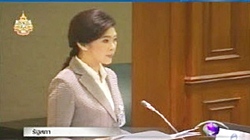BANGKOK, Aug 23 – Thai Prime Minister Yingluck Shinawatra on Tuesday delivered her government’s policy statement to the joint sitting of the Parliament, pledging to run the country with honesty and efficiency to reunite the country and bring happiness back to the Thai people.
Ms Yingluck told Parliament at the opening of the two-day government policy debate that her government is determined to rebuild solidarity and national reconciliation for the sake of national development and to benefit the Thai people.

The prime minister said the government classified the policies into two phases: urgent policies which need to be implemented in the first year and the policies to be applied later on during the four-year term.
Ms Yingluck stated in a two-hour policy statement delivery that the urgent policies included national reconciliation and the restoration of democracy, as well as rehabilitation plan for those of all parties who have been affected in several years of political divisiveness.
The urgent policies also included the drugs problem as a national agenda concern, along with an integrated water management plan to prevent and manage flooding, restoring relations with neighbouring countries, reducing income tax for juristic persons and improvement of the public’s quality of life through, for example, wage increases and debt suspension for farmers.
For the four-year plan, Ms Yingluck said it would focus on national security including reverence for and protection of the monarchy and the country’s defence system.
The premier said the long-term plan also covered the transparency and efficiency of the country’s administration, improvement of social conditions and quality of life, policies regarding lands and natural resources and environmental management.
Ms Yingluck also pledged to Parliament that her government would run the country transparently and efficiency so that the country will be able to compete with other countries and that peace and happiness be restored to the Thai people.
Meanwhile, Dr Aat Pisanwanich, director of the Center for International Trade Studies of the University of Thai Chamber of Commerce, on Tuesday commented that the government’s policy statement responded to only two parts which are political and urgent economic problems such as policies on wage hikes and the paddy pledge scheme.
Dr Aat said the statement policies failed to enhance Thailand’s industrial, agricultural and service competitiveness, which is a primary selling point of the country.
Voicing a positive view on the durability of the government, the academic said he believed the government may last for a long time as some of its policies will satisfy a large portion of the public. In the long run, some policies — such as the rice pledge scheme – will reduce the competitiveness of the agricultural sector.




